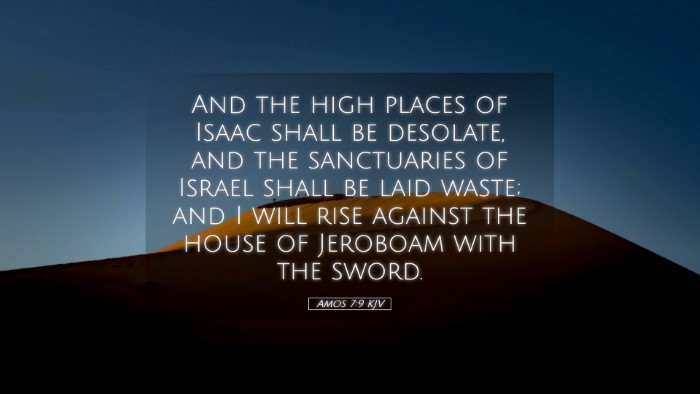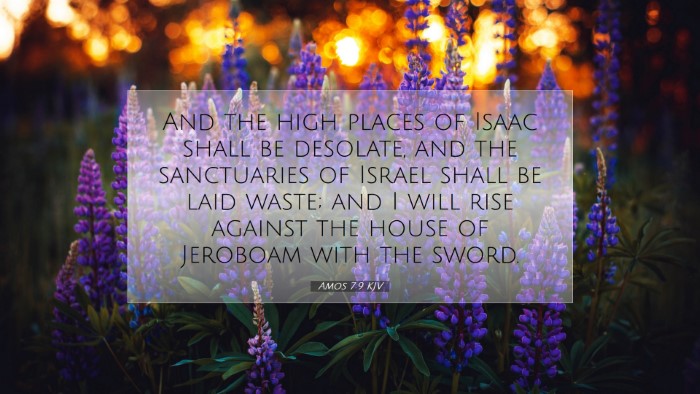Old Testament
Genesis Exodus Leviticus Numbers Deuteronomy Joshua Judges Ruth 1 Samuel 2 Samuel 1 Kings 2 Kings 1 Chronicles 2 Chronicles Ezra Nehemiah Esther Job Psalms Proverbs Ecclesiastes Song of Solomon Isaiah Jeremiah Lamentations Ezekiel Daniel Hosea Joel Amos Obadiah Jonah Micah Nahum Habakkuk Zephaniah Haggai Zechariah MalachiAmos 7:9
Amos 7:9 KJV
And the high places of Isaac shall be desolate, and the sanctuaries of Israel shall be laid waste; and I will rise against the house of Jeroboam with the sword.
Amos 7:9 Bible Commentary
Amos 7:9 - Commentary Summary
Amos 7:9 states: "And the high places of Isaac shall be desolate, and the sanctuaries of Israel shall be laid waste; and I will rise against the house of Jeroboam with the sword." This verse encapsulates a strong prophetic warning regarding the coming judgment upon Israel, highlighting the themes of idolatry, divine retribution, and the implications for their leadership.
Introduction to the Context
In the wider context of the Book of Amos, a prophetic discourse is delivered amid Israel's societal corruption and moral decay. The Lord, through His servant Amos, confronts Israel with their sins, particularly their reliance on false worship and social injustice. This verse serves as a concluding declaration to a series of visions that emphasize judgment and call for repentance.
Critical Analysis
1. Disruption of Worship
Matthew Henry emphasizes that the "high places of Isaac" symbolizes the centers of idolatrous worship that had supplanted true worship of God. By referring to Isaac, the patriarch associated with covenant and promise, it underscores the grievous nature of their apostasy. The reference to desolation signifies not only a physical destruction but a spiritual abandonment by God.
2. Judgment on the Sanctuaries
Albert Barnes comments extensively on the "sanctuaries of Israel," noting that these places, while designed for worship, had become hubs of corruption and depravity. They illustrate the profound irony of places meant for sacredness being subjected to ruin as a judgment from God.
3. Divine Warfare Against Leadership
Amos's declaration of God's intent to "rise against the house of Jeroboam with the sword" represents the political and spiritual ramifications of Israel's leadership failing to guide the people towards faithfulness. Adam Clarke elaborates on the notion of Jeroboam's dynasty as emblematic of moral corruption; this creates a linkage between national leadership and the spiritual state of the people.
Thematic Implications
1. Spiritual Desolation
The verse reflects a critical theme within prophetic literature: the consequences of turning away from covenant fidelity. The desolation indicated here serves as not only a historical event but a theological warning. Matthew Henry suggests that God's protective presence is contingent upon the obedience of His people, thus their breaches open the door to calamity.
2. Consequences of Idolatry
Albert Barnes articulately notes the dangers of allowing cultural practices to infiltrate worship, leading to a syncretism that dilutes the holiness of God. The judgement foretold in Amos 7:9 serves as an admonition against the perils of idolatry, calling all believers to examine their own practices and the purity of their worship.
3. Righteous Judgment
Adam Clarke points out that God's judgment, while severe, is rooted in righteousness. It is corrective rather than arbitrary, designed to lead a wayward people back to Himself. The invasion by foreign powers (represented by the sword) serves as a mechanism through which God seeks to purify His people.
Application for Today
The insights from Amos 7:9 encourage reflection on personal and corporate worship practices, urging leaders and congregants alike to evaluate the authenticity of their faith expressions.
- Challenge to Idolatry: In a contemporary context, one must consider what modern "high places" may exist that distract from the true worship of God. These can manifest in various forms, from materialism to ideologies that erode biblical truth.
- Call to Integrity in Leadership: Leaders are reminded of their sacred responsibility to shepherd their communities toward righteousness. The fall of Jeroboam's house serves as a cautionary tale for those in positions of authority.
- Embrace of True Worship: The desolation foretold should propel believers towards renewal in their worship practices, emphasizing sincerity and devotion to God alone.
Conclusion
Amos 7:9 serves as a powerful reminder of the consequences that arise when a people forsake the true God for the empty promises of idols. The insights from public domain commentaries reinforce the relevance of this prophetic warning, urging a response of reflection, repentance, and a return to fidelity in worship. For pastors, students, theologians, and scholars, this verse provides rich grounds for exploring the interplay of faith, leadership, and societal values in both historic and contemporary contexts.


